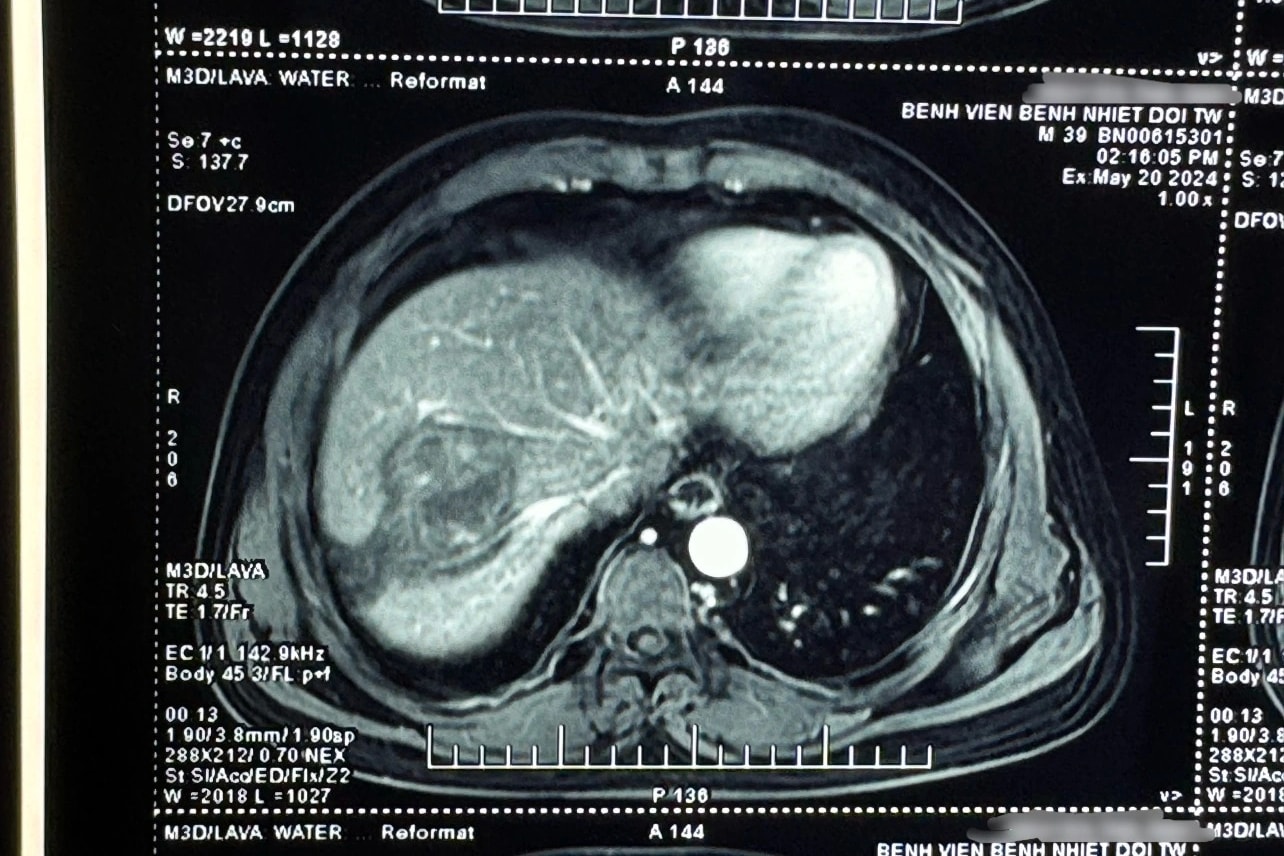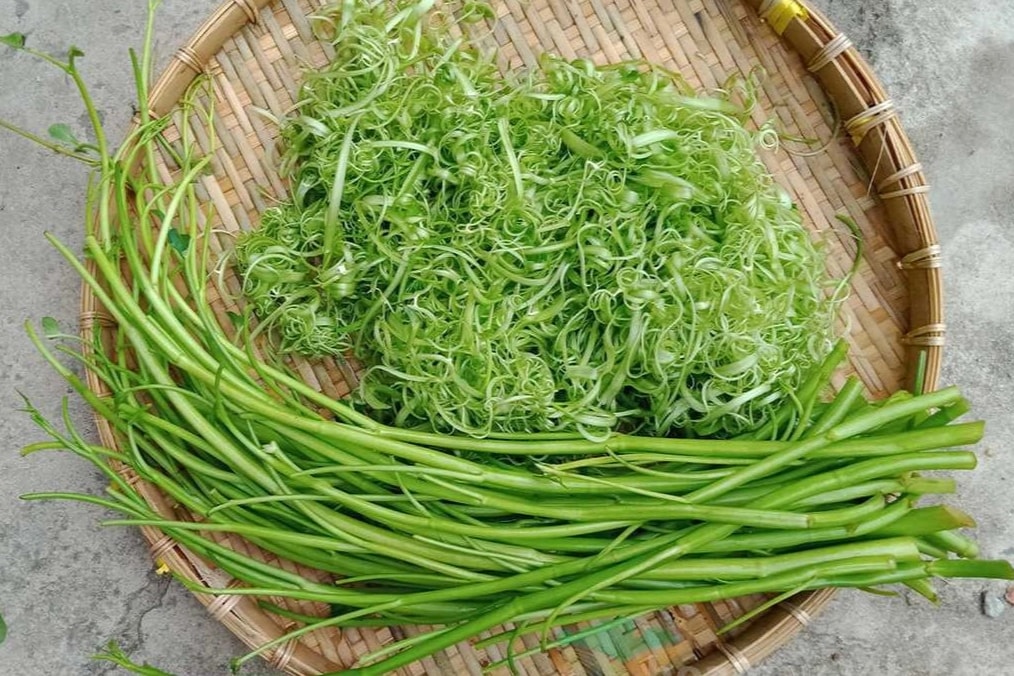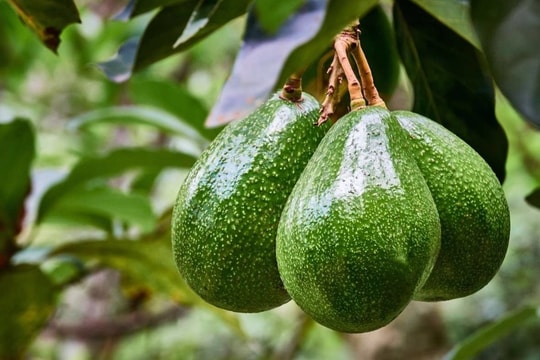Tapeworms get into the liver because of eating water spinach the wrong way
If a person is chronically infected with large liver flukes and is not treated for a long time, it can lead to complications: cholangitis, gallstones, cholecystitis, pancreatitis, biliary cirrhosis and liver fibrosis.
Tapeworms get into the liver because of eating raw vegetables
Mr. NTD, 39 years old, in Phu Yen came to the Central Institute of Hematology and Blood Transfusion for a check-up to receive chemotherapy.
However, the patient had a cough and fever. By chance, an abdominal ultrasound revealed a mass in the liver. He was diagnosed with a liver abscess and transferred to the Central Hospital for Tropical Diseases for examination and treatment.
The patient had a history of acute leukemia and had received 5 chemotherapy courses at the National Institute of Hematology and Blood Transfusion.

Dr. Vu Minh Dien examines a patient. Photo: Provided by the hospital
Before going to Hanoi, the patient had a cough with phlegm, chest pain on both sides when coughing, and a fever during the day and had to be hospitalized for a week.
Talking to the doctor, Mr. D. said that he has a hobby (addiction) to eating raw vegetables, especially water spinach grown in ponds and lakes and raw Vietnamese coriander.
He was very addicted to grilled fish wrapped in water spinach and roasted duck or steamed duck with raw Vietnamese coriander. Even when he was in the hospital in Phu Yen, he still ate this dish regularly.
Dr. Vu Minh Dien - Deputy Head of Internal Medicine Department, Central Hospital for Tropical Diseases said: "Through clinical examination and patient history, we thought of the giant liver fluke.

Worm nest in patient's liver. Photo: Provided by the hospital
Initial tests showed elevated eosinophils and liver MRI was highly suggestive of fascioliasis.
According to Dr. Dien, people with liver fluke disease often have symptoms of dull, nonspecific right hypochondriac pain.
Patients often feel tired, full and have indigestion. Many cases have no obvious clinical manifestations. Acute liver fluke infection can cause abdominal pain, enlarged liver, nausea, fever, hives, weight loss...
If a person is chronically infected with large liver flukes and is not treated for a long time, it can lead to complications: cholangitis, gallstones, cholecystitis, pancreatitis, biliary cirrhosis and liver fibrosis.
To determine whether a person has liver fluke or not, it is necessary to rely on testing techniques to find fluke eggs in the stool or blood tests to find antibodies in the patient's serum.
Diseases from the mouth
Statistics in 2023 showed that more than 12,000 people with giant liver fluke were treated at medical facilities.
According to Dr. Dien, in humans, worms parasitize in the liver and gallbladder. In unusual cases, worms can parasitize in muscles, under the skin... (ectopic parasitism).
Adult worms lay eggs through the bile duct into the intestine and out with the feces. The eggs go into the water, hatch into ciliated larvae and parasitize snails, develop into cercariae, cercariae leave the snail and attach to aquatic vegetables to form cysts or swim freely in the water.

People should limit eating raw vegetables that grow underwater. Photo: Getty
Humans or cattle that eat aquatic plants or drink water containing larvae will be infected with giant liver fluke.
When people eat raw vegetables growing in water or drink water contaminated with tapeworm larvae, the tapeworm larvae enter the stomach, go down to the duodenum, separate themselves from the shell and penetrate the duodenum wall into the peritoneal cavity to the liver, perforate the liver capsule and invade the liver parenchyma, causing liver damage.
This is also the stage that stimulates the body's strongest immune response. Liver flukes mainly parasitize liver tissue, but during the invasion stage, the flukes can migrate and cause damage to other organs such as the intestinal wall and stomach wall.
After 2-3 months of invading the liver parenchyma, the flukes enter the bile duct and lay eggs. Here, the adult flukes can parasitize and cause disease for many years (up to 10 years) if not detected and treated.
To prevent liver fluke disease, Dr. Vu Minh Dien recommends: "This disease is related to people's eating habits and customs, so disease prevention is an extremely important and necessary issue.
People should not eat raw vegetables that grow underwater such as: water spinach, Vietnamese coriander, celery, watercress, jute... Do not drink raw water.
When suspecting infection with large liver flukes, you must go to a medical facility (specialist) for timely diagnosis and treatment. People who have the habit of eating vegetables that grow in water (ponds, lakes, etc.), raw or not properly processed, should also go for examination and screening for the disease./.




